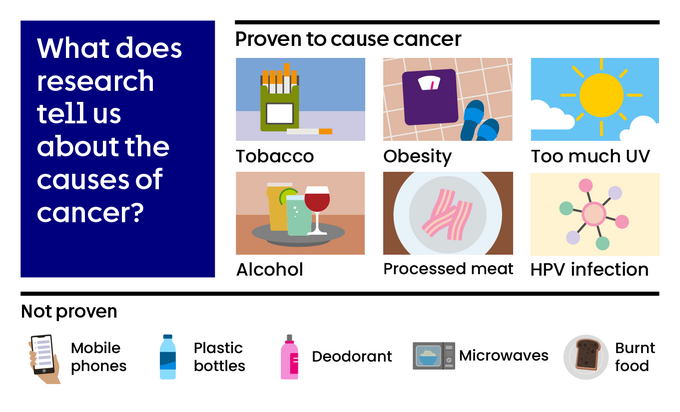Do genetically modified foods cause cancer?
-
Genetically modified (GM) foods don’t cause cancer
-
GM foods are regulated for safety in the UK
-
Your overall diet (what you eat day-to-day) is more important for your cancer risk than any individual ingredient or food.
Why are some people worried about genetically modified foods and cancer?
Genetically modified (GM) foods are foods from animals or plants that have had their genes changed (modified). Genes are instructions that tell plants and animals how to grow and function. Genes can be modified in crops and animals to make them grow faster, produce more food or be more resistant to disease.
GM foods are not common in the UK. The main use of GM crops is in animal feed and cooking oils.
Some people are worried that GM foods might cause cancer. For example, if changing the genes could introduce harmful substances to the food. Or if we ourselves could have our genes changed by eating GM foods. However, research has shown that these things do not happen.
What does the research say about genetically modified foods and cancer?
GM foods do not cause cancer. There is no evidence that eating GM foods causes cancer. And there aren’t any good explanations for how GM foods could cause cancer.
We have been changing the genes of living things for hundreds of years by choosing specific plants and animals to breed to get certain outcomes. This is called artificial selection. Modern genetic modification is like a quicker version of artificial selection. Scientists agree that GM foods are just as safe as non-GM foods.
GM foods are carefully monitored around the world. In Great Britain, the Food Standards Agency (FSA), Food Standards Scotland (FSS), and the Advisory Committee on Novel Foods and Processes (ACNFP) check GM foods are safe. In Northern Ireland, the European Food Standards Agency checks GM foods are safe.
GM foods can only be sold in the UK if they:
- don’t present a risk to health,
- don’t mislead consumers, such as with inaccurate labelling or marketing,
- don’t have less nutritional value than the same food in non-GM form.
GM foods are not common in the UK, but any GM food will be clearly labelled.
What are the proven causes of cancer?
There are many myths, questions and hot topics when it comes to cancer risk. But thanks to decades of research into preventing cancer, we know proven ways you can lower your risk.
These include not smoking, keeping a healthy weight, staying safe in the sun, cutting down on alcohol and eating a healthy, balanced.
Diet and cancer risk
Eating GM foods won’t increase your risk of cancer. Your overall diet (what you eat day-to-day) is more important for your cancer risk than any individual ingredient or food. A healthy, balanced diet can reduce the risk of cancer.
This means eating mostly:
- fruit and vegetables,
- wholegrains such as wholemeal bread and brown versions of pasta and rice,
- healthy protein sources like chicken, fish and pulses
And cutting down on processed and red meat, alcohol, and foods that are high in sugar, fat and salt.
We used many references to produce this information, and it is not possible to list them all here. These are the key references with a short explanation of each one:
Genetically modified foods. Food Standards Agency (updated January 2018) [Accessed September 2024].
The Food Standards Agency monitors the safety of GM foods in England and Wales.
Genetically modified (GM) food & feed assessments. Advisory Committee on Novel Foods and Processes (updated January 2021) [Accessed September 2024].
The Advisory Committee on Novel Foods and Processes helps monitor the safety of GM foods in England, Wales and Scotland.
Genetically engineered crops: experiences and prospects. National Academies of Sciences, Engineering, and Medicine. National Academies Press, 2016
The National Academies are scientific bodies in the US that look at issues of public importance. They evaluated all available evidence on GM crops, and found no evidence of cancer risk in humans.
Evaluation of adverse effects/events of genetically modified food consumption: a systematic review of animal and human studies. C Shen and others. Environmental Sciences Europe 2022.
This study looked at the results of over 200 studies investigating the health effects of GM foods. It did not find evidence for GM foods causing cancer in people.
Last reviewed: 19 December 2024
Next review due: 19 December 2027



